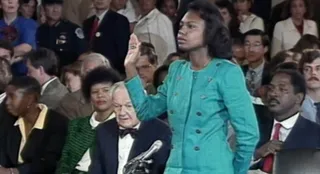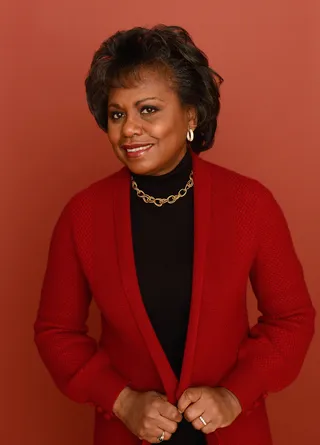Anita Hill: How Her Words Sparked Waves of Political Change
The Thomas-Hill hearing continues to empower women today.

1 / 17
Standing by Her Story - Twenty-two years ago, a 35-year-old, soft-spoken law professor accused then-Supreme Court Justice nominee Clarence Thomas of sexual harassment before a national audience. Today, an Oscar-winning director is bringing Hill's transformative story to the big screen. Take a look back at the explosive hearing and learn how Anita inspired social and political reformations.(Photo: Courtesy of Samuel Goldwyn Films)
Photo By Photo: Samuel Goldwyn Films

2 / 17
A Bright Future - Born in Lone Tree, Oklahoma, Hill was a model student, having graduated from both Oklahoma State University in 1977 and Yale Law School in 1980 with honors. (Photo: Alex Wong/Newsmakers/Getty Images)

3 / 17
Assisting Clarence Thomas - She then began a promising law career in Washington, D.C., at a law firm before moving on to work as an attorney-adviser to Clarence Thomas, who was then the Assistant Secretary of the U.S. Department of Education's Office for Civil Rights. (Photo: Richard Ellis/Getty Images)

4 / 17
Clarence Thomas Controversy - In 1982, Hill served as Thomas's assistant when he became Chairman of the U.S. Equal Employment Opportunity Commission (EEOC), but left the position one year later. Hill's reason for leaving came to light in 1991, when she came forward with accusations that her former boss, and by then Supreme Court nominee, had sexually harassed her while at the EEOC.(Photos: Liaison/Getty Images; Alex Wong/Newsmakers/Getty Images)

5 / 17
Sex, Race and Politics - Hill's allegations, which Thomas flatly denied, sparked a widespread media storm around sex, race and politics. (Photo: Courtesy of TIME Magazine)
ADVERTISEMENT

6 / 17
Inappropriate Behavior - Hill claimed that after declining invitations to dates with him, Thomas began harassing her with pornographic films and inappropriate discussion of sexual acts. On Oct. 13, 1991, Hill reportedly passed a lie-detector test about her statements.(Photo: Reuters/Landov)

7 / 17
Uneven Playing Field - The all-white, all-male Senate before Hill asked her to repeat mortifyingly graphic details, such as discussions of penis size and descriptions of pubic hair on Coke cans. She also faced aggressive questions from some senators.(Photo: Rick Wilking/Reuters/Landov)

8 / 17
"A High-Tech Lynching" - Thomas famously referred to the hearing as "a high-tech lynching for uppity Blacks," when he testified about Hill's claims before the Senate Judiciary Committee. With no direct evidence presented to resolve the conflict, the hearing essentially boiled down to Thomas's word against Hill's, along with her credibility. (Photo: REUTERS/Rick Wilking/Landov)

9 / 17
The Honorable Clarence Thomas - Ultimately, the Senate voted 52-48 — the narrowest margin in more than a century — to confirm Thomas to the U.S. Supreme Court. In the final floor vote, 46 Democrats and two Republicans voted to reject the nomination, while 41 Republicans and 11 Democrats voted to confirm. (Photo: REUTERS/William Collins/Landov)

10 / 17
No Press Allowed - Since the hearing and his confirmation, Thomas has actively limited media coverage of his private life. However, he did release a best-selling autobiography titled My Grandfather's Son in 2007, for which he received a $1.5 million advance. (Photo: REUTERS/Kevin Lamarque)
ADVERTISEMENT

11 / 17
"He Shouldn't Have Been Confirmed" - "I believe in my heart that he shouldn’t have been confirmed," Hill recently told The New York Times. Since Thomas's Supreme Court confirmation in 1991, Hill has been leading a deeply private life. She currently teaches social policy, law and women’s studies at Brandeis University.(Photo: Melina Mara/The Washington Post)

12 / 17
Anita Inspires Watershed Moment - This hearing and Thomas's confirmation became a watershed moment in American politics, inspiring women around the nation to successfully raise national awareness about sexual harassment in the workplace. As a result, sexual harassment claims shot up and Congress passed a law allowing sex discrimination victims to sue for damages. (Photo: LUKE FRAZZA/AFP/Getty Images)

13 / 17
Year of Women - The entire controversy also motivated many women, including Carol Moseley Braun, to run for office. The 1992 election year was dubbed the "Year of Women." Twenty-four women also won seats in the House of Representatives. (Photo: Jemal Countess/Getty Images for Time Warner)

14 / 17
Black History Was Also Made - In a history-making turn, 11 women ran for seats in the U.S. Senate and five won, including Carol Moseley Braun (left), the first African-American woman to be elected to the Senate. (Photos: Scott Olson/Getty Images; T.J. Kirkpatrick/Getty Images; Alex Wong/Getty Images)

15 / 17
I Still Believe - In 2012, Amy Richards and Cynthia Greenberg co-edited a collection of essays written by Melissa Harris-Perry, Gloria Steinem, Charles Ogletree, Edwidge Danticat and other notable figures spanning three generations. I Still Believe Anita Hill aims to show the many ways in which Hill's testimony inspired both men and women and changed the feminist movement.(Photo: Courtesy of The Feminist Press at CUNY)
ADVERTISEMENT

16 / 17
Anita in Theaters - When the documentary Anita premieres on March 21, the world will finally get an intimate look at the woman behind the hearing through never-before-seen glimpses into Hill's private life as well as interviews with Hill, herself. (Photo: Courtesy of Samuel Goldwyn Films)
